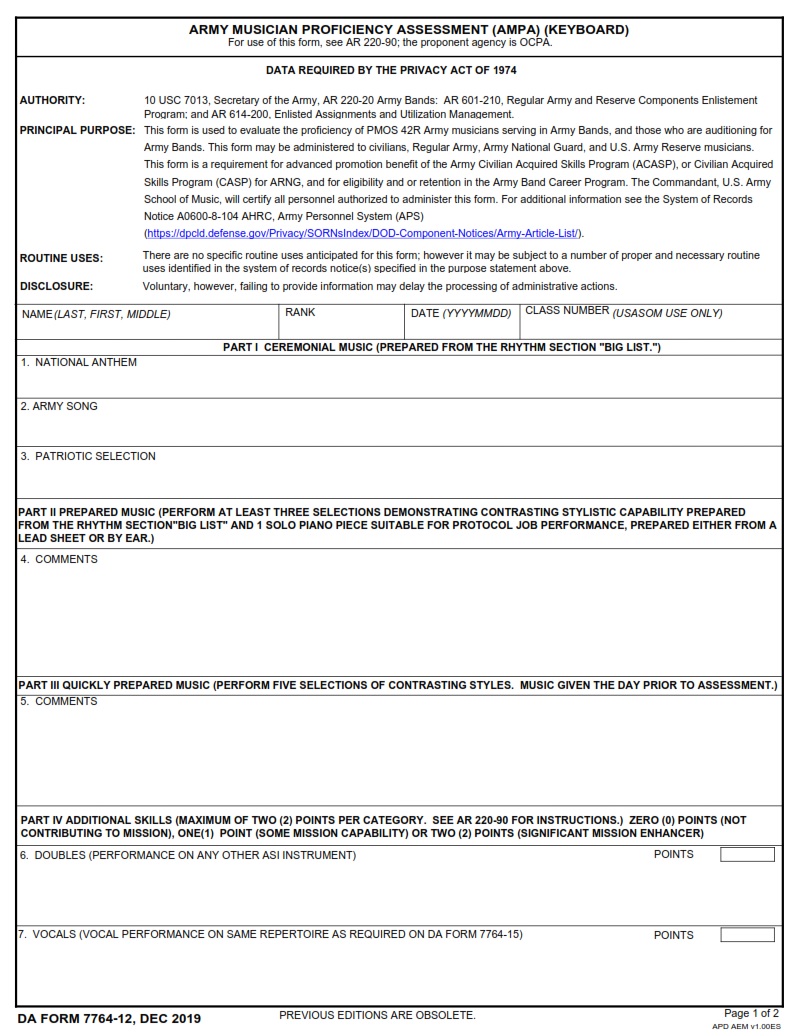DAFORMFILLABLE.COM | DA FORM 7764-12 Fillable – Army Pubs 7764-12 PDF – DA FORM 7764-12, known as the Army Musician Proficiency Assessment (AMPA) (Keyboard), is a crucial document used within the United States Army to evaluate the proficiency of musicians specializing in keyboard instruments. This form was published on December 1, 2019, and remains active as of the current date. It is an essential tool for assessing the technical skills and musical abilities of Army musicians.
DA FORM 7764-12 – Army Musician Proficiency Assessment (AMPA) (Keyboard)
| Form Number | DA FORM 7764-12 |
| Form Title | Army Musician Proficiency Assessment (AMPA) (Keyboard) |
| Form Date | 12/1/2019 |
| Form Proponent | OCPA |
Purpose and Importance of DA FORM 7764-12
The primary purpose of DA FORM 7764-12 is to ensure that Army musicians meet the required standards of proficiency on the keyboard. This form is part of a broader set of assessments designed to maintain the high standards of the Army’s musical units. The Army Musician Proficiency Assessment evaluates various aspects of a musician’s capabilities, including technical execution, musical interpretation, and overall performance quality.
Key Details of DA FORM 7764-12
Publication Information
- Publication/Form Number: DA FORM 7764-12
- Publication/Form Date: 12/01/2019
- Publication/Form Title: ARMY MUSICIAN PROFICIENCY ASSESSMENT (AMPA) (KEYBOARD)
- Publication/Form Proponent: OCPA (Office of the Chief of Public Affairs)
- Publication/Form Status: ACTIVE
- Prescribed Forms/Prescribing Directive: AR 220-90
- Superseded/Replaced Other Publication/Form: REVISED DA FORM 7764-12, 10/01/2016
- Security Classification: UNCLASSIFIED
- Distribution Restriction Code: A APPROVED FOR PUBLIC RELEASE; DISTRIBUTION IS UNLIMITED
Relevance and Use
The DA FORM 7764-12 is used under the guidelines of AR 220-90, which outlines the policies and procedures for Army musical activities. This form is unclassified and approved for public release, meaning it can be freely distributed and accessed by those within the military and associated support roles.
Components of the Army Musician Proficiency Assessment (Keyboard)
Technical Skills Evaluation
The technical skills section of the assessment focuses on the musician’s ability to execute various technical requirements on the keyboard. This includes scales, arpeggios, chord progressions, and other fundamental exercises that demonstrate technical proficiency.
Musical Interpretation
In the musical interpretation section, musicians are evaluated on their ability to interpret and perform pieces of music. This part of the assessment looks at how well the musician conveys the musicality, dynamics, and expressive elements of the compositions they play.
Performance Quality
The overall performance quality is a comprehensive assessment of the musician’s capabilities. This includes their preparedness, stage presence, and ability to perform under pressure. The aim is to ensure that Army musicians can deliver high-quality performances in various settings.
Importance for Army Musicians
For Army musicians, especially those specializing in keyboard instruments, achieving a high score on the DA FORM 7764-12 is crucial. It not only validates their skills but also plays a significant role in their professional development and opportunities within the Army. High proficiency scores can lead to increased responsibilities, performance opportunities, and career advancement within military musical units.
Conclusion
DA FORM 7764-12 – Army Musician Proficiency Assessment (AMPA) (Keyboard) is a vital document for maintaining the excellence of the Army’s musical talents. By rigorously evaluating the technical skills, musical interpretation, and performance quality of keyboard musicians, the Army ensures that its musical units remain among the best. Understanding and utilizing this form is essential for Army musicians striving for excellence in their field.
For more detailed information and access to the form, individuals can visit the official Army publications website or consult AR 220-90 for the prescribing directives.
